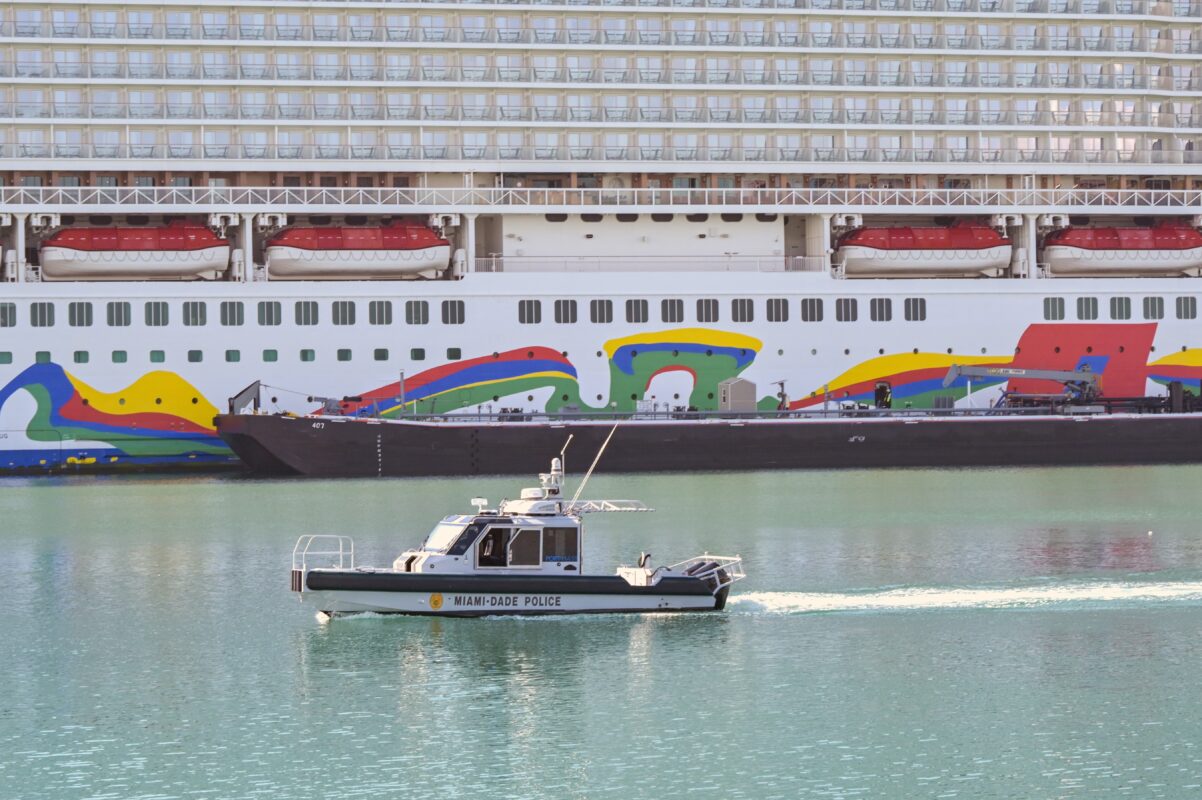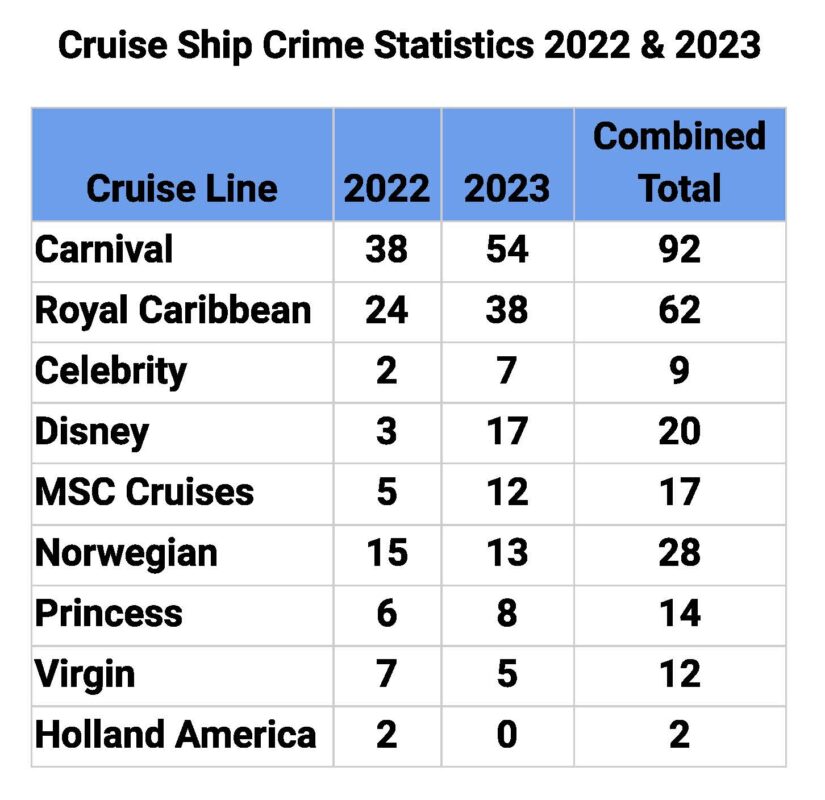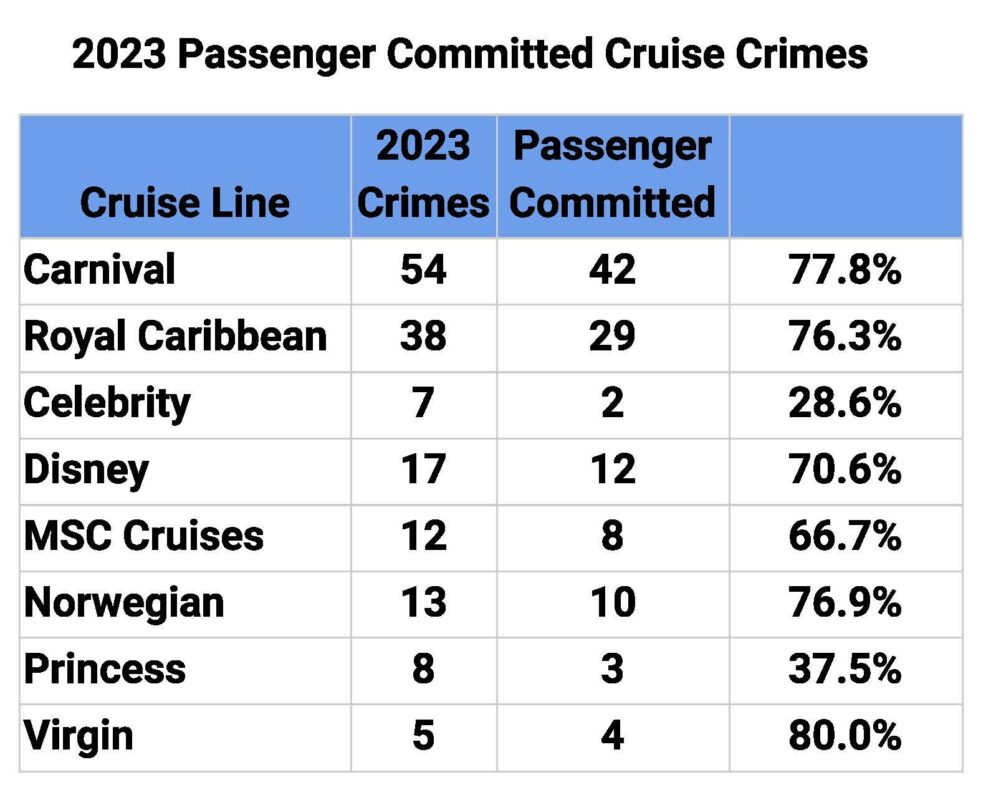Wherever large groups of humans gather, the odds are very high that criminal activity will transpire. Sadly, this is also true for crime on cruise ships. The situation can be more complicated due to the isolated environment and international waters adding layers of complexity to jurisdiction and law enforcement issues. Despite these challenges and reports that crimes on cruise ships may have increased in recent years (particularly sexual assaults), overall incidents are rare, and cruise lines continue to take comprehensive security measures to protect passengers and prevent or reduce crimes.
Cruise operators adhere to strict safety protocols, including surveillance systems and onboard security personnel. They are also regulated by legal standards, notably the Cruise Vessel Security and Safety Act (CVSSA), which oversees crime reporting and response protocols. Awareness of these security measures, understanding your rights onboard, and knowing how to report crimes promotes a safer journey for everyone.
Key Takeaways
- The overall incidence rate of serious crimes on cruise ships is relatively low.
- Fellow passengers commit the majority of reported crimes.
- Crimes on cruise ships are managed through various security personnel, protocols, and international laws.
An Overview of Crime on Cruise Ships

When you board a cruise ship, you’re stepping into a unique jurisdictional environment where maritime law applies. While the setting might suggest a break from everyday concerns, you must know that crime can occur at sea just as it does on land.
Statistics and Frequency of Crimes
Recognition that serious crimes, including sexual assaults, occur on cruise ships can be alarming. But some context is important. According to the Cruise Lines International Association, the risk of violent crimes on cruise ships runs 95% lower than crime rates found in typical American cities.

Types of Crimes Committed on Cruise Ships
Cruise ships witness a wide range of criminal activities. High-profile types often include:
- Sexual Assault: This is a severe crime often reported on board, ranging from harassment to rape.
- Theft: Personal belongings of passengers or crew can be targeted for theft, leading to financial loss and distress.
- Violence: Incidents can encompass everything from simple altercations to serious homicides or suspicious deaths, demanding investigation from authorities.
Each type of crime carries its own implication for the safety and well-being of individuals on cruise ships, underlying the importance of stringent security measures and legal protocols in these international waters.
Legal Framework
Understanding the legal framework governing crimes on cruise ships involves a complex mix of jurisdiction, international agreements, and specific legislation.
Jurisdiction and Laws
Jurisdiction over a crime committed on a cruise ship typically depends on the ship’s location at the time of the incident, the nationality of the victims and perpetrators, and the country of the ship’s registration. Most cruise ships are registered under foreign flags, which complicates jurisdiction.
Under admiralty and maritime law, the laws of the country whose flag the ship flies are generally applicable. If a crime occurs in another country’s territorial waters, that country may also have jurisdiction.
International Agreements
The United Nations Convention on the Law of the Sea (UNCLOS) provides a framework for maritime jurisdiction. It describes the rights and responsibilities of nations in using the world’s oceans and establishes guidelines for businesses, the environment, and the management of marine natural resources. However, the enforcement of laws while at sea can often be governed by bilateral or multilateral treaties between nations.
United States Legislation
The U.S. Code, Title 18, section 113 covers penal code offenses applicable to the maritime and territorial jurisdiction of the United States. This includes crimes on American ships or foreign ships involving U.S. citizens. Additionally, crimes on board cruise ships may fall within the scope of Admiralty and Maritime Jurisdiction, allowing the United States to exercise authority over contractual and tortious actions at sea.
Cruise Vessel Security and Safety Act
The Cruise Vessel Security and Safety Act was signed into law in the United States in 2010. This legislation requires cruise lines to comply with certain security and safety measures. It mandates reporting crimes to U.S. authorities, implementing security technology such as surveillance systems, and ensuring vessel design includes features to prevent and respond to crimes at sea.

Safety and Security Measures
When you embark on a cruise, your safety and security are upheld by strict policies, a dedicated security team, and encouraged common sense practices. These layers ensure that the likelihood of incidents is minimized and that you can enjoy your vacation with peace of mind.
Cruise Line Safety Policies
Most cruise lines have comprehensive safety policies to protect you, the passenger. After the passing of the Cruise Vessel Security and Safety Act of 2010 (CVSSA), cruise ships were mandated to implement safety measures, which include the presence of peepholes on doors, the use of security cameras in public areas, and the availability of shipboard medical staff capable of performing forensic sexual assault examinations.
- Peepholes on cabin doors
- Railings designed to prevent accidental falls
- Security cameras in public areas
- Confidential reporting mechanisms for crimes
Onboard Security Personnel
Major cruise lines typically maintain sophisticated security departments run by former professional law enforcement officials and have a staff of competent, qualified security personnel available 24/7.

Cruise security personnel are trained to handle various incidents and ensure your safety. These teams are prepared to address security issues rapidly and are often comparable to land-based law enforcement officers. The presence of these teams is to deter potential security threats and to provide immediate assistance when needed.
According to CLIA, all major cruise ships have security that meets the following criteria:
- At least one onboard crew member trained in crime prevention and investigation
- Security Patrols conducted 24/7
- The security team collaborates with the port authority and international law enforcement when required.
U.S. federal laws also require cruise lines to maintain a video surveillance system to detect and deter crime. Robust video surveillance plays a key role in cruise ship security. The presence of these systems not only deters crime but also provides forensic documentation of incidents and activities. We are also seeing an increased use of cruise ship security officers routinely sporting body cameras.
Passenger Safety and Common Sense Practices
Your personal safety onboard a cruise also depends on your actions and vigilance. Employing common-sense practices similar to those you would employ at home significantly helps maintain a safe environment. Strategies such as:
- Securing personal belongings in safes
- Maintaining control of your cabin key
- Being mindful of alcohol consumption and potentially predatory environments

Crime Reporting and Response
The FBI has jurisdiction over crimes committed at sea when the cruise ship is bound for or departed from a U.S. port. The U.S. Coast Guard also plays a vital role in this process, assisting with law enforcement duties. They are responsible for supporting the investigations and liaising with local police authorities when needed.
Data and Transparency
One key feature of the CVSSA concerns the data collection and reporting requirements. The Act mandates that cruise lines report allegations of crimes to the FBI and that the Department of Transportation (DOT) makes statistical crime data available to the public. These quarterly reports are readily available on the DOT’s website.
We have reviewed the public reports posted for calendar years 2022 and 2023 and summarized key data points below.

Prevention and Education
Cruise lines implement various preventive measures such as security cameras and regular security patrols. Crew members receive training on these systems to promptly detect and respond to potential threats. This training covers the use of surveillance technology, personal safety drills, and crime response protocols.
Who Commits Crimes on Cruise Ships?
When you encounter media coverage of criminal activity on cruise ships, it often features crimes committed by cruise line employees. While such crimes do occur, they are not the greatest source of danger.
Most onboard crimes appear to be committed by fellow passengers rather than crew. For example, in the calendar year 2023, more than 70% of the cruise ship crimes reported were identified as passenger-committed crimes. So, for instance, focusing on the statistics from 2023 quarterly reports:

Process Considerations
- Prosecution Challenges: Legal outcomes often hinge on the complexity of international law and jurisdictional challenges. Victims may find themselves in a web of differing legal systems based on where the ship is registered and the waters it is in.
- Outcome of Sexual Assault Cases: Many sexual assaults on cruise ships lead to extensive investigations, with varying results—some lead to convictions, while others remain unresolved due to jurisdictional complications.
- Physical Assaults and Murder: Physical assaults can result in rigorous shipboard investigations and potential involvement by the Coast Guard or FBI when docked in U.S. ports. Cases that reach a verdict often hinge on clear evidence and witness testimonies.
- Thefts and Prosecutions: Cruise lines often handle minor thefts internally, and this may involve focusing on having property returned to its rightful owner rather than punishing would-be wrongdoers. However, if the crime is significant (e.g., more than $10,000), larger theft incidents can trigger law enforcement involvement.
- Preventive Measures: Cruise lines have increasingly implemented advanced security protocols and crew trainings to prevent and respond to crimes. For instance, an increasing number of onboard security personnel wear body cameras.
Safety Tips for Parents
If you’re sailing with children, staying informed about the ship’s safety features and the available children’s programs is essential. Employ these tips to protect your family further:
- Ensure your kids know their cabin number and how to always contact you.
- Educate your children about who the safe staff members are, should they need assistance.
- Familiarize yourself with the children’s activity centers and the qualifications of those in charge.
- For kids who are allowed to roam the ship independently, ensure they know they are not to enter staterooms of passengers not traveling with you — even if invited to do so.
- Never climb or sit on railings. It’s not even if it looks “safe” to do so.
Key Takeaways and Recommendations
When embarking on a cruise, your safety is paramount. Here are essential strategies to enhance your security and ensure a more enjoyable journey:
- Be Informed: For peace of mind, familiarize yourself with the safety procedures and the ship’s layout.
- Alcohol Consumption: Be mindful of circumstances where alcohol consumption can place you in a vulnerable position.
- Contact Numbers: In case you need to report a crime, Keep the contact details for the relevant authorities, such as the FBI, at 202.324.3000.
- Personal Belongings: Safeguard your valuables using the safe provided in your room and minimize the cash on hand.
- Vigilance: Stay vigilant about your surroundings and report any suspicious activity to the ship’s security.
- Crew Interaction: Limit personal interactions with crew members to professional contexts and avoid accepting invitations to crew quarters.
- Companions: Travel with a trusted friend or group and establish check-in times.
At a minimum, apply at least the same vigilance about your surroundings and activities as you would at home. Your proactive approach contributes significantly to the safety and well-being of everyone onboard.
Closing Thoughts
While the prospect of crime on cruise ships may understandably cause concern, cruise lines have implemented many security measures to protect passengers. While the overall incidence of crimes on cruise ships is generally less than what you see on land, it is not zero. Passengers should remain aware of their surroundings and take personal safety precautions as they would at home.

